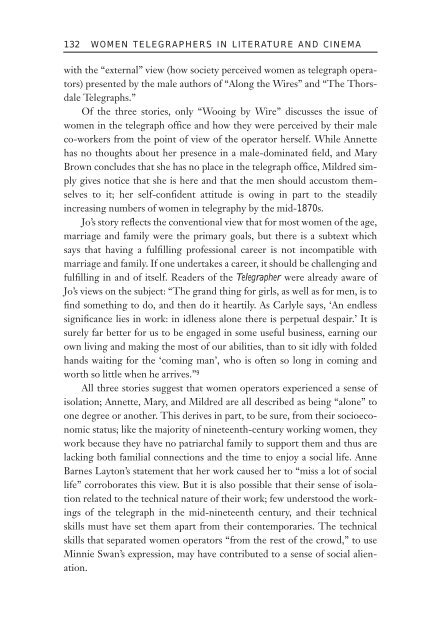My Sisters Telegraphic: Women in the Telegraph Office ... - Monoskop
My Sisters Telegraphic: Women in the Telegraph Office ... - Monoskop
My Sisters Telegraphic: Women in the Telegraph Office ... - Monoskop
You also want an ePaper? Increase the reach of your titles
YUMPU automatically turns print PDFs into web optimized ePapers that Google loves.
132<br />
WOMEN TELEGRAPHERS IN LITERATURE AND CINEMA<br />
with <strong>the</strong> “external” view (how society perceived women as telegraph operators)<br />
presented by <strong>the</strong> male authors of “Along <strong>the</strong> Wires” and “The Thorsdale<br />
<strong>Telegraph</strong>s.”<br />
Of <strong>the</strong> three stories, only “Woo<strong>in</strong>g by Wire” discusses <strong>the</strong> issue of<br />
women <strong>in</strong> <strong>the</strong> telegraph office and how <strong>the</strong>y were perceived by <strong>the</strong>ir male<br />
co-workers from <strong>the</strong> po<strong>in</strong>t of view of <strong>the</strong> operator herself. While Annette<br />
has no thoughts about her presence <strong>in</strong> a male-dom<strong>in</strong>ated field, and Mary<br />
Brown concludes that she has no place <strong>in</strong> <strong>the</strong> telegraph office, Mildred simply<br />
gives notice that she is here and that <strong>the</strong> men should accustom <strong>the</strong>mselves<br />
to it; her self-confident attitude is ow<strong>in</strong>g <strong>in</strong> part to <strong>the</strong> steadily<br />
<strong>in</strong>creas<strong>in</strong>g numbers of women <strong>in</strong> telegraphy by <strong>the</strong> mid-1870s.<br />
Jo’s story reflects <strong>the</strong> conventional view that for most women of <strong>the</strong> age,<br />
marriage and family were <strong>the</strong> primary goals, but <strong>the</strong>re is a subtext which<br />
says that hav<strong>in</strong>g a fulfill<strong>in</strong>g professional career is not <strong>in</strong>compatible with<br />
marriage and family. If one undertakes a career, it should be challeng<strong>in</strong>g and<br />
fulfill<strong>in</strong>g <strong>in</strong> and of itself. Readers of <strong>the</strong> <strong>Telegraph</strong>er were already aware of<br />
Jo’s views on <strong>the</strong> subject: “The grand th<strong>in</strong>g for girls, as well as for men, is to<br />
f<strong>in</strong>d someth<strong>in</strong>g to do, and <strong>the</strong>n do it heartily. As Carlyle says, ‘An endless<br />
significance lies <strong>in</strong> work: <strong>in</strong> idleness alone <strong>the</strong>re is perpetual despair.’ It is<br />
surely far better for us to be engaged <strong>in</strong> some useful bus<strong>in</strong>ess, earn<strong>in</strong>g our<br />
own liv<strong>in</strong>g and mak<strong>in</strong>g <strong>the</strong> most of our abilities, than to sit idly with folded<br />
hands wait<strong>in</strong>g for <strong>the</strong> ‘com<strong>in</strong>g man’, who is often so long <strong>in</strong> com<strong>in</strong>g and<br />
worth so little when he arrives.” 9<br />
All three stories suggest that women operators experienced a sense of<br />
isolation; Annette, Mary, and Mildred are all described as be<strong>in</strong>g “alone” to<br />
one degree or ano<strong>the</strong>r. This derives <strong>in</strong> part, to be sure, from <strong>the</strong>ir socioeconomic<br />
status; like <strong>the</strong> majority of n<strong>in</strong>eteenth-century work<strong>in</strong>g women, <strong>the</strong>y<br />
work because <strong>the</strong>y have no patriarchal family to support <strong>the</strong>m and thus are<br />
lack<strong>in</strong>g both familial connections and <strong>the</strong> time to enjoy a social life. Anne<br />
Barnes Layton’s statement that her work caused her to “miss a lot of social<br />
life” corroborates this view. But it is also possible that <strong>the</strong>ir sense of isolation<br />
related to <strong>the</strong> technical nature of <strong>the</strong>ir work; few understood <strong>the</strong> work<strong>in</strong>gs<br />
of <strong>the</strong> telegraph <strong>in</strong> <strong>the</strong> mid-n<strong>in</strong>eteenth century, and <strong>the</strong>ir technical<br />
skills must have set <strong>the</strong>m apart from <strong>the</strong>ir contemporaries. The technical<br />
skills that separated women operators “from <strong>the</strong> rest of <strong>the</strong> crowd,” to use<br />
M<strong>in</strong>nie Swan’s expression, may have contributed to a sense of social alienation.

















